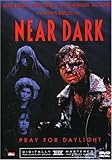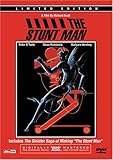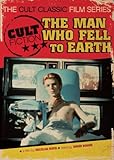101 Cult Movies
The Year’s Work In Lebowski Studies
The Man Who Fell to Earth

Amazon.co.uk Review
While other films directed by Nicolas Roeg have attained similar cult status (including Walkabout and Don’t Look Now), none has been as hotly debated as this languid but oddly fascinating adaptation of the science fiction novel by Walter Tevis. In The Man Who Fell to Earth, David Bowie plays the alien of the title, who arrives on Earth with hopes of finding a way to save his own planet from turning into an arid wasteland. He funds this effort by capitalising on several highly lucrative inventions, and in so doing becomes the powerful leader of an international corporate conglomerate. But his success has negative consequences as well–his contact with Earth has a disintegrating effect that sends him into a tailspin of disorientation and metaphysical despair. The sexual attention of a cheerful young woman (Candy Clark) doesn’t do much to change his outlook, and his introduction to liquor proves even more devastating, until, finally, it looks as though his visit to Earth may be a permanent one. The Man Who Fell to Earth is definitely not for every taste–it’s a highly contemplative, primarily visual experience that Roeg directs as an abstract treatise on (among other things) the alienating effects of an over-commercialised society. Stimulating and hypnotic or frightfully dull, depending on your receptivity to its loosely knit ideas, it’s at least in part about not belonging, about being disconnected from the world–about being a stranger in a strange land when there’s really no place like home. –Jeff Shannon.
Stunt Man

Amazon.co.uk Review
The “lost” sleeper hit of 1980 has since become one of the most revered cult movies of all time, largely due to its bawdy, irreverent story about the art and artifice of filmmaking and an outrageously clever performance by Peter O’Toole. As megalomaniacal film director Eli Cross, O’Toole plays a larger-than-life figure whose ability to manipulate reality is like a power-trip narcotic. The focus of his latest mind game is a fugitive (Steve Railsback) recruited to replace a stuntman killed during a recent on-set accident. In return for protective sanctuary, the fugitive takes a crash course in stunt work but soon discovers that he’s the paranoid player in a game he can’t control, with the dictatorial director making up the rules. Or is he? The Stunt Man is a game of its own, played through the fantasy of filmmaking, and half the fun of watching the movie comes from sharing the stuntman’s paranoid confusion. Barbara Hershey has a smart, sexy supporting role as a lead actress who won’t submit to her director’s seemingly devious behaviour; but it’s clearly O’Toole who steals the show. Director Richard Rush adds to the movie’s maverick appeal–in a career plagued by struggles against the mainstream studio system, Rush hasn’t made a better movie before or since. The Stunt Man clearly represents the potential of his neglected talent. –Jeff Shannon
Near Dark

Amazon.co.uk Review
The word “vampire” is never mentioned in Near Dark, but that doesn’t stop this 1987 cult favourite from being one of the best modern-era vampire films. It put then-unknown director Kathryn Bigelow on Hollywood’s radar and gave choice roles to Aliens costars favoured by Bigelow’s ex-husband James Cameron–Lance Henriksen is the leader of a makeshift family of renegade bloodsuckers, nocturnally seeking victims in rural Oklahoma; his immortal gal pal is Aliens and T2 alumnus Jenette Goldstein; and Bill Paxton is the group’s deadliest leather-clad ass kicker. Fellow traveller Jenny Wright lures Okie farm boy Adrian Pasdar into the group with a love bite and he’s soon turning toward vampirism with a combination of frightened revulsion and relentless desire. With Joshua Miller as the youngest vampire, Near Dark is Bigelow’s masterpiece of low-budget ingenuity–a truck-stop thriller that begins well, gets better and better (aided by a fine Tangerine Dream score) and goes out in a blaze of glory. –Jeff Shannon
Harold and Maude
Amazon.co.uk Review
Black comedies don’t come much blacker than cult favourite, Harold and Maude (1972), and they don’t come much funnier either. It seems that director Hal Ashby was the perfect choice to mine a load of eccentricity from the original Colin Higgins script, about the unlikely romance between a death-obsessed 19-year-old named Harold (Bud Cort) and a life-loving 79-year-old widow named Maude (Ruth Gordon). They meet at a funeral, and Maude finds something oddly appealing about Harold, urging him to “reach out” and grab life by the lapels as opposed to dwelling morbidly on mortality. Harold grows fond of the old gal–she’s a lot more fun than the girls his mother desperately tries to match him up with- -and together they make Harold and Maude one of the sweetest and most unconventional love stories ever made. Much of the early humour arises from Harold’ s outrageous suicide fantasies, played out as a kind of twisted parlour game to mortify his mother, who has grown immune to her strange son’s antics. Gradually, however, the film’s clever humour shifts to a brighter outlook and finally arrives at a point where Harold is truly happy to be alive. Featuring soundtrack songs by Cat Stevens, this comedy certainly won’t appeal to all tastes (it was a box-office flop when first released), but if you’re on its quirky wavelength, it might just strike you as one of the funniest films you’ve ever seen. –Jeff Shannon, Amazon.com
The Stunt Man

Amazon.co.uk Review
The “lost” sleeper hit of 1980 has since become one of the most revered cult movies of all time, largely due to its bawdy, irreverent story about the art and artifice of filmmaking and an outrageously clever performance by Peter O’Toole. As megalomaniacal film director Eli Cross, O’Toole plays a larger-than-life figure whose ability to manipulate reality is like a power-trip narcotic. The focus of his latest mind game is a fugitive (Steve Railsback) recruited to replace a stuntman killed during a recent on-set accident. In return for protective sanctuary, the fugitive takes a crash course in stunt work but soon discovers that he’s the paranoid player in a game he can’t control, with the dictatorial director making up the rules. Or is he? The Stunt Man is a game of its own, played through the fantasy of filmmaking, and half the fun of watching the movie comes from sharing the stuntman’s paranoid confusion. Barbara Hershey has a smart, sexy supporting role as a lead actress who won’t submit to her director’s seemingly devious behaviour; but it’s clearly O’Toole who steals the show. Director Richard Rush adds to the movie’s maverick appeal–in a career plagued by struggles against the mainstream studio system, Rush hasn’t made a better movie before or since. The Stunt Man clearly represents the potential of his neglected talent. –Jeff Shannon



